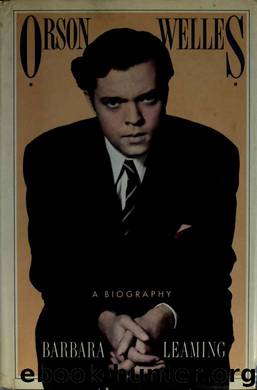Orson Welles, a biography by Leaming Barbara

Author:Leaming, Barbara
Language: eng
Format: epub
Tags: Welles, Orson, 1915-1985, Motion picture producers and directors
Publisher: New York, N.Y. : Viking
Published: 1985-08-05T16:00:00+00:00
Orson Welles
business, it being generally agreed that any public man owes his position to the public."
The inherent wisdom of the people had been a theme of Orson's since he and Skipper had planned Everybody's Shakespeare, and the troubled relationship between the privileged artist/intellectual (such as he clearly was) and the general public was to become an important subtext of Orson's politics. In his case, it was a relationship that had been seriously put in question at the Amhersons screening at Pomona, which, for Orson, had epitomized the mass audience's unexpected rejection of what he had hoped to communicate to them. Politics now afforded Orson another chance. After Roosevelt's reelection in 1944, Orson's political involvement would give him the sense of oneness with the public at large that he had not been able to achieve as a filmmaker. "The intellectual has often found a kind of comfort in the avowal of a minority opinion," he would write. ''But now there is no more of that queer comfort for American liberals. The election [of 1944] forces on all of us the duties and the responsibilities of participation in the cause of the majority. We can none of us proclaim again that the masses are unprepared for what we have to say to them. If we make such queer claims we are only admitting that we haven't yet managed to interest the people. The first liberal in our land has held their attention for twelve years. They have listened to him and it is a matter of record and a fact in history that he has listened to them."
It is not too much to suppose that here Orson was trying to work out what must have been his confused feelings about the masses' not having been ready for films like Amhersons or—^more abstractly— It's All True, when that very same populace flocked to kitsch like Disney's Sa-ludos Amigos. He was afraid that as a filmmaker he had failed on the one count that mattered: "The only problem is to interest them," Orson once said of the mass audience. "Once they are interested they understand anything in the world. That must be the feeling of the moviemaker." It was also, clearly, the feeling of the politician; and Orson's political participation allowed him the sense of having communicated—of having communed —with the masses, the majority. His confidence in the inherent wisdom of the people had been renewed.
Not long after his debut in Free World Orson's name began to appear on the journal's masthead as an editorial writer. Over the next
Download
This site does not store any files on its server. We only index and link to content provided by other sites. Please contact the content providers to delete copyright contents if any and email us, we'll remove relevant links or contents immediately.
| Acting & Auditioning | Broadway & Musicals |
| Circus | Direction & Production |
| History & Criticism | Miming |
| Playwriting | Puppets & Puppetry |
| Stage Lighting | Stagecraft |
Call Me by Your Name by André Aciman(20484)
Ready Player One by Cline Ernest(14630)
How to Be a Bawse: A Guide to Conquering Life by Lilly Singh(7464)
Wiseguy by Nicholas Pileggi(5762)
The Kite Runner by Khaled Hosseini(5160)
On Writing A Memoir of the Craft by Stephen King(4924)
Audition by Ryu Murakami(4919)
The Crown by Robert Lacey(4799)
Call me by your name by Andre Aciman(4672)
Gerald's Game by Stephen King(4636)
Harry Potter and the Cursed Child: The Journey by Harry Potter Theatrical Productions(4488)
Dialogue by Robert McKee(4385)
The Perils of Being Moderately Famous by Soha Ali Khan(4204)
Dynamic Alignment Through Imagery by Eric Franklin(4204)
Apollo 8 by Jeffrey Kluger(3701)
The Inner Game of Tennis by W. Timothy Gallwey(3666)
Seriously... I'm Kidding by Ellen DeGeneres(3622)
How to be Champion: My Autobiography by Sarah Millican(3578)
Darker by E L James(3508)
